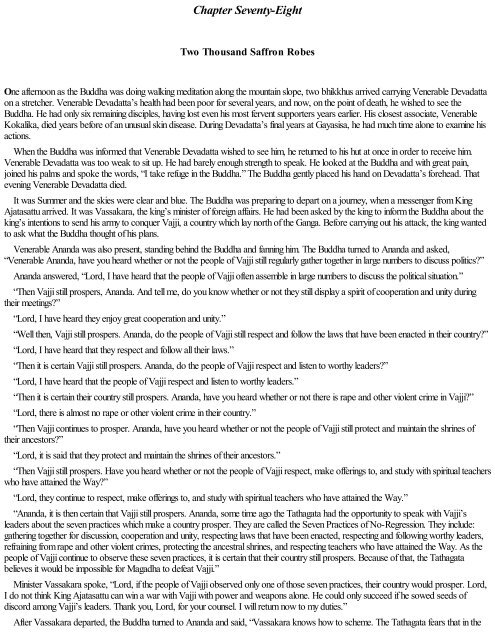old-path-white-clouds-thich-nhat-hanh
old-path-white-clouds-thich-nhat-hanh
old-path-white-clouds-thich-nhat-hanh
You also want an ePaper? Increase the reach of your titles
YUMPU automatically turns print PDFs into web optimized ePapers that Google loves.
Chapter Seventy-Eight<br />
Two Thousand Saffron Robes<br />
One afternoon as the Buddha was doing walking meditation along the mountain slope, two bhikkhus arrived carrying Venerable Devadatta<br />
on a stretcher. Venerable Devadatta’s health had been poor for several years, and now, on the point of death, he wished to see the<br />
Buddha. He had only six remaining disciples, having lost even his most fervent supporters years earlier. His closest associate, Venerable<br />
Kokalika, died years before of an unusual skin disease. During Devadatta’s final years at Gayasisa, he had much time alone to examine his<br />
actions.<br />
When the Buddha was informed that Venerable Devadatta wished to see him, he returned to his hut at once in order to receive him.<br />
Venerable Devadatta was too weak to sit up. He had barely enough strength to speak. He looked at the Buddha and with great pain,<br />
joined his palms and spoke the words, “I take refuge in the Buddha.” The Buddha gently placed his hand on Devadatta’s forehead. That<br />
evening Venerable Devadatta died.<br />
It was Summer and the skies were clear and blue. The Buddha was preparing to depart on a journey, when a messenger from King<br />
Ajatasattu arrived. It was Vassakara, the king’s minister of foreign affairs. He had been asked by the king to inform the Buddha about the<br />
king’s intentions to send his army to conquer Vajji, a country which lay north of the Ganga. Before carrying out his attack, the king wanted<br />
to ask what the Buddha thought of his plans.<br />
Venerable Ananda was also present, standing behind the Buddha and fanning him. The Buddha turned to Ananda and asked,<br />
“Venerable Ananda, have you heard whether or not the people of Vajji still regularly gather together in large numbers to discuss politics?”<br />
Ananda answered, “Lord, I have heard that the people of Vajji often assemble in large numbers to discuss the political situation.”<br />
“Then Vajji still prospers, Ananda. And tell me, do you know whether or not they still display a spirit of cooperation and unity during<br />
their meetings?”<br />
“Lord, I have heard they enjoy great cooperation and unity.”<br />
“Well then, Vajji still prospers. Ananda, do the people of Vajji still respect and follow the laws that have been enacted in their country?”<br />
“Lord, I have heard that they respect and follow all their laws.”<br />
“Then it is certain Vajji still prospers. Ananda, do the people of Vajji respect and listen to worthy leaders?”<br />
“Lord, I have heard that the people of Vajji respect and listen to worthy leaders.”<br />
“Then it is certain their country still prospers. Ananda, have you heard whether or not there is rape and other violent crime in Vajji?”<br />
“Lord, there is almost no rape or other violent crime in their country.”<br />
“Then Vajji continues to prosper. Ananda, have you heard whether or not the people of Vajji still protect and maintain the shrines of<br />
their ancestors?”<br />
“Lord, it is said that they protect and maintain the shrines of their ancestors.”<br />
“Then Vajji still prospers. Have you heard whether or not the people of Vajji respect, make offerings to, and study with spiritual teachers<br />
who have attained the Way?”<br />
“Lord, they continue to respect, make offerings to, and study with spiritual teachers who have attained the Way.”<br />
“Ananda, it is then certain that Vajji still prospers. Ananda, some time ago the Tathagata had the opportunity to speak with Vajji’s<br />
leaders about the seven practices which make a country prosper. They are called the Seven Practices of No-Regression. They include:<br />
gathering together for discussion, cooperation and unity, respecting laws that have been enacted, respecting and following worthy leaders,<br />
refraining from rape and other violent crimes, protecting the ancestral shrines, and respecting teachers who have attained the Way. As the<br />
people of Vajji continue to observe these seven practices, it is certain that their country still prospers. Because of that, the Tathagata<br />
believes it would be impossible for Magadha to defeat Vajji.”<br />
Minister Vassakara spoke, “Lord, if the people of Vajji observed only one of those seven practices, their country would prosper. Lord,<br />
I do not think King Ajatasattu can win a war with Vajji with power and weapons alone. He could only succeed if he sowed seeds of<br />
discord among Vajji’s leaders. Thank you, Lord, for your counsel. I will return now to my duties.”<br />
After Vassakara departed, the Buddha turned to Ananda and said, “Vassakara knows how to scheme. The Tathagata fears that in the


